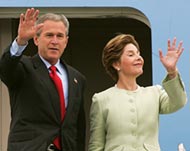US lawmakers doubt NATO role in Iraq
US lawmakers and administration officials have downplayed prospects for NATO troop contributions to Iraq.

Members of the Senate Armed Services Committee on Friday pointed to NATO’s ineffectiveness in other conflict zones as reasons why no NATO troops may be dispatched to Iraq.
“How can we expect NATO to perform this mission, given the current status of its inability to live up to commitments in Afghanistan? How can they take on this additional mission in Iraq?” asked Senate Armed Services Committee Chairman John Warner, a Virginia Republican.
‘Lack of will’
Deputy Defence Secretary Paul Wolfowitz, appearing before Warner’s committee, said, “I fear I share your concerns. … There are terrific deficiencies in capabilities, and there is, I think, a certain lack of political will.”
Wolfowitz claimed that NATO’s capacity had “enormously” been reduced in the past 10 years.
|
There are terrific deficiencies in capabilities, and there is, I think, a certain lack of political will” Paul Wolfowitz, |
But Deputy Secretary of State Richard Armitage said while he was concerned about “the hollowing out” of NATO, its involvement in Iraq “will give a lot of political cover for countries to participate, and I think that is significant.”
The debate over NATO involvement overshadowed President George Bush’s trip to Turkey to attend a NATO summit on Monday.
Bush is expected to ask the military alliance to respond to Iraqi interim Prime Minister Ayad Allawi’s request for training in Iraq as well as equipment and technical assistance.
Bush was in Ireland on Friday for a summit between the US and the European Union.
Chickens coming home
The committee’s top Democrat, Carl Levin of Michigan, called NATO’s reluctance to participate in Iraq “chickens coming home to roost”, a reaction to what he termed the Bush administration’s unilateral approach and disregard for allies.
With days remaining before the so-called handover of authority from the US-led occupying administration to an interim Iraqi government, Democrats and Republicans on the committee sharply questioned Wolfowitz and Armitage on the deteriorating situation in Falluja and the deadly wave of attacks in six cities that killed about 100 people on Thursday.
 |
|
President Bush is enroute to |
Armitage said the sophistication of the attacks “indicates to me a certain level of command and control. … Someone’s giving general orders and other people are following them.”
He also said that “as we move forward toward 30 June, I think those fellows who attacked yesterday are going to reload and try again, and as we move toward the elections in December and January, they’re really going to exercise themselves.”
Wolfowitz said there may be coordination between loyalists to Saddam Hussein and foreign fighters, even though they have different long-term goals for Iraq.
“I think there may be more than one central nervous system and there may be a loose coordination between them,” Wolfowitz said. “I think the basic point is their immediate aim, which is the overriding one, which is to defeat us.”
Under testy questioning from Republican Senator John McCain of Arizona, Wolfowitz acknowledged that “virtually none” of the results US forces sought when making a deal to hand over control of Falluja to resistance fighters had occurred.
Resistance fighters were to turn over those involved in the killings and mutilation of the bodies of four US contractors, alleged fighters and significant weapons.